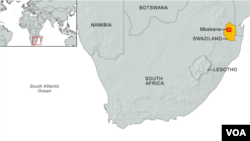Swaziland's outlawed trade union federation and other pro-democracy groups are planning a series of activities in February to pressure King Mswati III and his government to improve living conditions for public sector workers.
The activities would include demonstrations, sit-down strikes, symposiums, press conferences, and petitions that will be presented to the relevant authorities, according to Wandile Dludlu, national coordinator for a pro-democracy group known as the Swaziland United Democratic Front (SUDF).
He said the groups will also urge regional groups and the international community to help them pressure the government for more democratic reforms.
“We continue to build mass power on the ground," Dludlu said in a phone interview with VOA.
He said the Trade Union Congress of Swaziland (TUCOSWA), "together with other progressive formations, are putting up a demand which we are expecting in February. Demands around increment in salaries for workers, better working conditions but primarily, issues of a new and democratic Swaziland, are some of the key demands that we are putting up in the beginning of the year 2016.”
Public sector
The government in Mbabane has often blamed the recent global economic downturn for its failure to raise the pay of public sector workers. Prime Minister Barnabas Sibusiso Dlamini and other senior government officials have said there is a need for belt-tightening in the coming year.
The administration usually accuses the pro-democracy groups of fomenting trouble by engaging in violent activities, including acts of terrorism, to destabilize the country.
Dludlu said members of his group will not be deterred by any use of the police and other security agencies to clamp down on their activities.
“We will continue to do our part, [by] pushing and doing our best to mobilize masses, and sometimes succeeding and sometimes not succeeding. But we are looking up to a very powerful march coming in the beginning of the year. We will leave it to the government how they respond whether they resort to their usual violent response. But that will not, and should not and must not deter us,” said Dludlu.
The government plans to buy new cars for use by visiting heads of state and government when Swaziland hosts the Southern African Development Community (SADC) meeting next year. Pro-democracy groups say the planned purchases, which they estimate at more than $13 million, reflect misplaced government priorities.
Hypocrisy charges
Supporters of the government insist the administration has an obligation to host the summit as a member of the regional bloc. But Dludlu argued that the government cannot legitimately spend extravagantly on the summit while claiming it cannot afford to increase the pay of public sector workers.
“The reason why we are putting this demand is that on one hand they are saying the workers must tighten their belt, but they at the top are loosening their own belt, by spending more, buying new cars, a fleet of cars [to host] the SADC meeting. ... The expenditure of the monarchy is going up, but they are saying to the workers, we must tighten belt. It is on the basis of that is why we are not listening to them at all, because they seem not to walk their talk,” said Dludlu.
“The summit cannot be done at the expense of the abject poverty that continues to ground and grind Swazis.”
Dludlu also said the government has failed to help farmers who can’t work and are in debt because of a drought plaguing several parts of the country.
“We say like the government of Malawi, we have seen them cutting their expenditure ever since the coming of a new president [there], which is a great example. That you can continue to meet your regional responsibility, but at a very reasonable spending,” said Dludlu. “But what we have seen the king doing is his usual appetite for leisure and pleasure at the expense of our people.”




